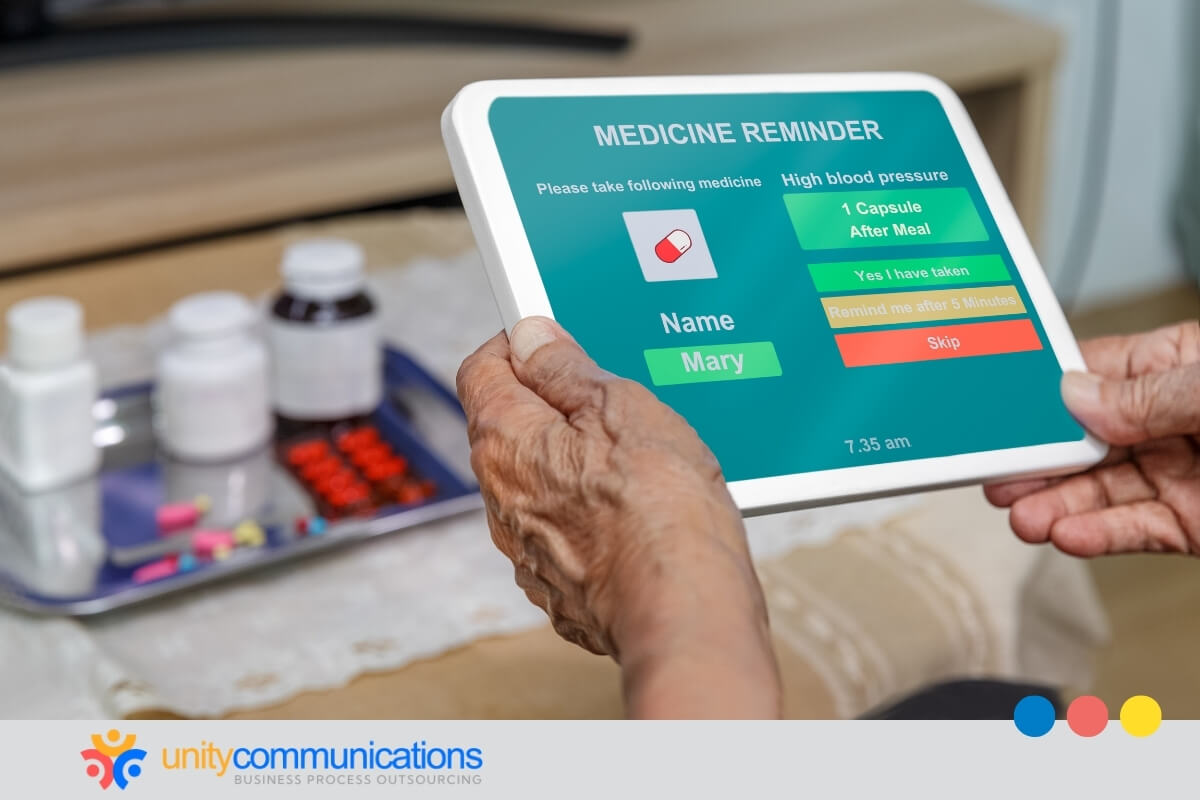Table of Contents
Oncology patients often face complex medical journeys that require precise and compassionate care coordination. The multifaceted nature of cancer treatment, involving multiple specialists and frequent monitoring, demands an efficient system for managing patient care.
Virtual medical assistants (VMAs) in oncology have become integral to this process, providing critical support to streamline communication and data management. Through VMA integration, healthcare providers can ensure patients receive the highest level of care, allowing for a more seamless and supportive treatment experience.
Keep reading to learn how virtual medical assistant services can enhance your oncology services.
Outsourcing virtual medical assistants in oncology

Business process outsourcing (BPO) has become an effective solution for healthcare providers to access top talent. But what is BPO, and how does it provide VMA support?
Outsourcing is the practice of delegating non-core business functions to specialized firms. In BPO in telemedicine, service providers deploy competent VMAs to effectively manage various activities. These can include:
- Managing patient scheduling and appointment reminders
- Coordinating communication between healthcare providers and patients
- Assisting with medical billing and coding
- Handling patient inquiries and follow-ups
- Updating and maintaining electronic health records (EHRs)
Virtual medical assistants are continuously trained to maintain efficiency and accuracy in the healthcare process in BPO. Through outsourcing, oncology practices can engage these skilled remote professionals to support their operations and care delivery.
Managing patient information and treatment schedules
Following oncology treatment schedules is crucial for maximizing the effectiveness of cancer therapies; timely interventions are vital to successful outcomes. Adhering to these schedules also minimizes complications and delivers treatment optimally.
Virtual medical assistants (VMAs) can effectively manage patient information and treatment schedules for oncology practices. They can coordinate comprehensive patient care plans and meticulously organize each treatment step for optimal care.
Healthcare BPO services are crucial for seamless communication among healthcare providers. VMAs perform these critical tasks to manage oncology care:
- Scheduling chemotherapy sessions. VMAs book treatments promptly and coordinate with oncology teams.
- Coordinating radiation therapy appointments. They manage schedules to avoid conflicts and ensure timely sessions.
- Organizing follow-up appointments. Virtual assistants manage post-treatment care to prevent or minimize complications and increase medication adherence.
- Maintaining patient records. VMAs update and manage electronic health records so that all providers can access the latest patient information.
- Facilitating patient communication. VMAs handle reminders and updates, informing patients about their appointments and treatment plans.
- Processing patient inquiries. They promptly address patient questions and concerns, providing essential information and support throughout treatment.
A virtual assistant for Phoenix healthcare can significantly improve local oncology practices. With VMA support, clinics and patients can expect thorough treatment management.
Enhancing patient communication

Effective patient communication is crucial in the healthcare industry, especially oncology where patients require continuous support and guidance throughout their treatment.
Cancer patients often have questions about their care, ranging from understanding their diagnosis and treatment options to managing side effects and their impact on daily life. Addressing these concerns can significantly alleviate patients’ fears and doubts. It provides them with the reassurance and clarity to navigate their treatment journey confidently.
Virtual medical assistants in oncology settings maintain ongoing communication with patients and their families to keep them informed and supported. They enhance patient communication through the following:
- Sending medication reminders. VMAs send timely reminders to patients to increase treatment adherence.
- Managing side effects. They track patient-reported symptoms and alert healthcare providers to any concerns.
- Providing informational support. Virtual assistants also offer educational resources and answer questions related to treatment and care.
- Coordinating with support services. They connect patients with counseling, nutrition, and other supportive services as needed.
- Facilitating virtual consultations. VMAs schedule and manage telehealth appointments to provide patients with timely care.
By facilitating these essential tasks, VMAs make oncology patients and their families feel connected and supported throughout their treatment. This benefit contributes to better outcomes and a more positive patient experience.
Streamlining administrative processes
Healthcare practitioners in oncology clinics provide high-quality, efficient patient care. Their ability to manage various aspects of patient care is essential for timely and effective treatment, improving patient outcomes.
Outsourcing administrative tasks in healthcare, especially in oncology settings, is an effective strategy for supporting medical professionals and improving care. How outsourcing works underscores the value of VMAs in automating routine tasks, freeing healthcare staff to concentrate on patient care rather than paperwork.
Virtual medical assistants in oncology clinics streamline administrative processes by:
- Automating billing and coding. VMAs reduce errors and speed up the revenue cycle.
- Handling insurance verification. They keep patient coverage details accurate and up-to-date.
- Managing reporting and documentation. They also keep records organized and accessible for healthcare providers.
- Processing patient intake forms. Virtual assistants handle collecting and entering patient information for a smooth onboarding process.
- Scheduling and rescheduling appointments. They manage appointments efficiently to minimize scheduling conflicts and optimize clinic workflows.
- Managing patient correspondence. VMAs also communicate with patients regarding billing, appointments, and other administrative matters to keep them informed and engaged.
By streamlining processes, VMAs enable oncology professionals to focus on what truly matters: providing compassionate and effective patient care.
Selecting the best virtual medical assistants for oncology

Choosing the right virtual assistant is crucial for ensuring the efficient operation of an oncology clinic. VMAs in oncology must possess specialized skills and experience to handle the unique demands of cancer care.
Providers must consider these factors when selecting VMAs:
- Experience in oncology. The right VMA for an oncology clinic knows industry jargon and procedures.
- Technical proficiency. They must know how to use electronic health records (EHR) and other healthcare technologies to enhance efficiency and improve patient care outcomes.
- Strong communication skills. They must possess skills in effectively managing patient interactions and coordinating with healthcare teams.
- Attention to detail. The best VMA focuses on accuracy in scheduling, record-keeping, and administrative tasks.
By carefully evaluating these factors, clinics can hire the right virtual assistant to meet their specific needs and enhance the quality of patient care.
The bottom line
Virtual medical assistants in oncology help manage patient information, enhance communication, and streamline administrative tasks. These are crucial in cancer care.
Their integration into oncology practices improves operational efficiency and increases patient outcomes by ensuring coordinated and compassionate care.
Include a VMA in your practice for better patient experiences and a more efficient healthcare environment. Let’s connect!




